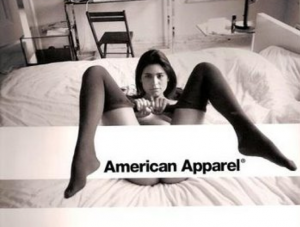The photo above is an advert campaign by the American brand American Apparel. Visually the image is very controversial and has received some critical comments about the ethics that surround it. At first glance we see the brand name on a thick white stripe that is partially covered by some black shapes, however up close you start to see the wider image of a woman who is partially naked laying on a bed in a very sexual position, only wearing what I think are a pair of their knee-high socks with the white stripe being the only part to cover her. Just a glance at this image you wouldn’t think anything of it, but if it were to be plastered across billboards and buses I can see where people are finding issues with it. Being a huge retail brand they reach a lot of people and subsequently a lot of young people who are generally known to be very impressionable. The image is very sexually suggestive and could imply ‘if you buy these socks, you could be in her position’ as if the socks give you a sexual desirability. At the same time – socks have connotations of innocence as they are a parts of a school uniform, which there ‘aesthetic is built on’ [Ferrier 2015].
These are two very juxtaposing ideas but they are often used in conjunction with each other due to them being controversial and taboo to talk about. This then brings up the issue of sex sells. As questionable as the topic is, it does work as it gets people talking which is ultimately what brands want. The more people talk, the more exposure they get and subsequently their revenue goes up. Many see it as a cop-out to get money quickly and that it breaks moral code on many levels, However the blunt truth is that it happens so much in today’s society, we are accustomed to it that we don’t really notice when it happens anymore even though it’s a frequently talked about debate. That being said, American apparel filed bankruptcy in 2015 and again in 2016 due to plunging sales and their advertising could be the reason. As wrote in Emotional Fashion Retail “An unethical advertising activity will also affect the economic dimension of a company, because some stakeholders may see this advertisement as irresponsible. This may lead to harmful publicity for the company or damage their relationship to the customers. Even the long-term survival is jeopardized” [Strähle 2015].
This could definitely be one explanation among many possible others as to their disappearance and the downfall of their public image. However, just through an internet search its clear the brand didn’t see how damaging their advertising was becoming as on Esquire.com they have adverts going back to 1995 showing the development of over-sexualized adverts. They still have stores in the US after selling the company out, but as an article in The Guardian writes that Dov Charney, the founder of brand and the man subject to many sexual harassment allegations within the company, had “sapped the company’s morale and took its sexualized image too far for young shoppers” [Farrell, S 2015].
Bibliography
Ferrier, M. (2015) American Apparel goes out of fashion and into bankruptcy https://www.theguardian.com/business/2015/oct/05/american-apparel-goes-out-of-fashion-and-into-bankruptcy Accessed: 30 November 2017
Strähle, J. (2015) Emotionalizing Fashion Retail (page 95) Nordstedt, Books on Demand
Farrell, S. (2015) American Apparel files for bankruptcy https://www.theguardian.com/business/2015/oct/05/american-apparel-files-for-bankruptcy Accessed: 30 November 2017

